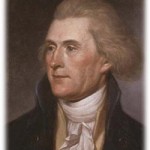Thomas Jefferson also see here 
Thomas Jefferson put “nature and nature’s god” in the Declaration of Independence. Nowhere does it say the Judeo-Christian god gave men their rights.
But it does me no injury for my neighbor to say there are twenty gods or no God. It neither picks my pocket nor breaks my leg. -, Notes on Virginia, 1782
Question with boldness even the existence of a god; because if there be one he must approve of the homage of reason more than that of blindfolded fear. -Thomas Jefferson, letter to Peter Carr, August 10, 1787
I have recently been examining all the knows superstitions of the world, an do not find in our particular superstition (Christianity) one redeeming feature, they are all alike, founded on fables and mythology.
I concur with you strictly in your opinion of the comparative merits of atheism and demonism, and really see nothing but the latter in the being worshipped by many who think themselves Christians. -Thomas Jefferson, letter to Richard Pricce, Jan. 8, 1789
I never submitted the whole system of my opinions to the creed of any party of men whatever in religion, in philosophy, in politics, or in anything else where I was capable of thinking for myself. Such an addiction is the last degradation of a free and moral agent. -Thomas Jefferson, letter to Francis Hopkkinson, March 13, 1789
Thomas Jefferson to Danbury Baptist Association
1 Jan. 1802
Believing with you that religion is a matter which lies solely between man and his God, that he owes account to none other for his faith or his worship, that the legislative powers of government reach actions only, and not opinions, I contemplate with sovereign reverence that act of the whole American people which declared that their legislature should “make no law respecting an establishment of religion, or prohibiting the free exercise thereof,” thus building a wall of separation between Church and State. Adhering to this expression of the supreme will of the nation in behalf of the rights of conscience, I shall see with sincere satisfaction the progress of those sentiments which tend to restore to man all his natural rights, convinced he has no natural right in opposition to his social duties.
Thomas Jefferson to Rev. Samuel Miller
23 Jan. 1808Works 11:7–9
Certainly no power to prescribe any religious exercise, or to assume authority in religious discipline, has been delegated to the general government
Thomas Jefferson, A Bill for Establishing Religious Freedom
12 June 1779Papers 2: facing 305
That the impious presumption of legislators and rulers, civil as well as ecclesiastical, who, being themselves but fallible and uninspired men, have assumed dominion over the faith of others, setting up their own opinions and modes of thinking, as the only true and infallible, and as such, endeavouring to impose them on others, hath established and maintained false religions over the greatest part of the world, and through all time:
Reason and persuasion are the only practicable instruments. To make way for these, free enquiry must be indulged; and how can we wish others to indulge it while we refuse it ourselves. But every state, says an inquisitor, has established some religion. No two, say I, have established the same. Is this a proof of the infallibility of establishments?
